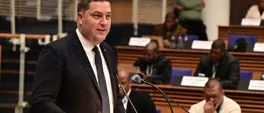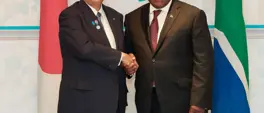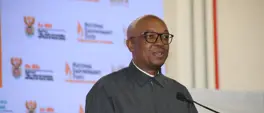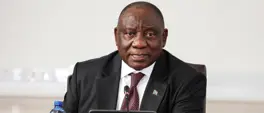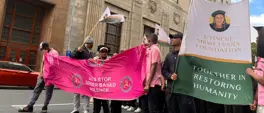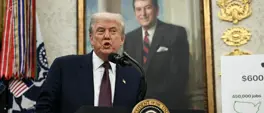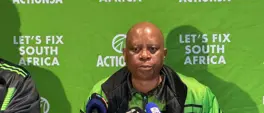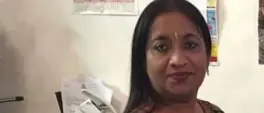MALAIKA MAHLATSI | The National Convention did not change my mind about the National Dialogue
Malaika Mahlatsi
20 August 2025 | 12:30"It is unconscionable that in 2025, the president genuinely believes that these are issues that a National Dialogue must reflect upon," writes Mahlatsi Malaika.
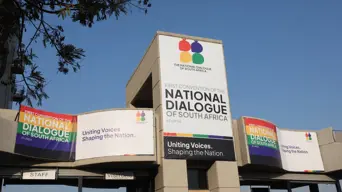
UNISA hosted the two-day convention for the National Dialogue at its main campus in Pretoria. Picture: @GovernmentZA/X
On the 15th of August, as I left my house in the northern suburbs of Johannesburg and drove to UNISA's main campus in Muckleneuk, Pretoria, to attend the first National Convention of the National Dialogue, there were many thoughts on my mind.
I was attending the National Convention as part of the media - an in-house analyst for Newzroom Afrika.
The first thought on my mind was that the National Convention should not have been taking place on the day. Days prior to the event, various organisations - political parties and non-governmental organisations had pulled out.
These include, among others, the Thabo Mbeki Foundation, the Desmond and Leah Tutu Foundation, the Steve Biko, and the FW de Klerk Foundation.
The legacy foundations cited concerns over the rushed timeline, inadequate preparation, and a shift towards government control as reasons for their withdrawal.
According to the legacy foundations, the National Dialogue was intended to be a citizen-driven and inclusive process, but ran the risk of morphing into a government-led initiative, eroding its legitimacy as a people’s dialogue.
Parties such as the Democratic Alliance (DA), the second biggest political party after the African National Congress (ANC), and a member of the Government of National Unity (GNU) had already withdrawn from the process (albeit for reasons I deem opportunistic).
The Freedom Front Plus (FF+) withdrew just a day before the event was scheduled to take place. Other political parties, including uMkhonto weSizwe Party (MKP), the biggest opposition party in South Africa, and the Economic Freedom Fighters (EFF), which won nearly 10 percent of the vote in the 2024 general election, the fourth highest after the ANC, DA and MKP, had long since stated their rejection of the National Dialogue.
The EFF, in a statement released on the 13th of June 2025, characterised the dialogue as a platform "for failed politicians to rehabilitate themselves under the guise of public consultation".
The MKP, which revealed that it was not invited to the dialogue and wouldn't have participated regardless, described it as "a politically compromising gathering" that was aimed at flattering president Cyril Ramaphosa rather than genuinely engaging with ordinary South Africans about the problems facing the country.
This is a sentiment is shared by many - and certainly, by the protestors who were gathered on sidewalks near the venue, raising issues around the privatisation of public goods, the erasure of the Khoi people from collective national memory, poor service delivery and high levels of unemployment.
It was this group that I first came across as I made my way through the police checkpoint a few meters from the UNISA entrance.
On the first day of the National Convention, the venue was abuzz with activity as delegates and the media waited in anticipation for proceedings to begin.
The contentious National Convention was flighted on all news channels, and the media was as invested as some South Africans in what the National Convention would achieve given the withdrawal of the legacy foundations and the crisis of legitimacy that exists around the role of the national government in the process.
President Cyril Ramaphosa, who delivered the keynote address, was supposed to convince South Africans about the value of the National Dialogue, given the crisis of legitimacy around it.
What he did, instead, was confirm the concerns and criticisms that are being levelled against the process. Specifically, he confirmed what the EFF has been raising about the platform being an attempt by the government to rehabilitate itself under the guise of public consultation.
Nowhere was this as aptly captured as in the part of his speech where, explaining what South Africans would have to cogitate on, said the following:
“We will need to have difficult conversations about many issues, including: Why do South African women have to live in fear of men? Why do so many people live in abject poverty and so few live lives of opulence? Why, after decades of democracy, are the prospects for a white child so much better than those of a black child? Why do women get paid less than men for the same work? Why, when we have a Bill of Rights, are LGBTQI+ people still discriminated against, stigmatised and harassed? Why do clinics run out of medicine? Why do taps run dry? These are some of the questions that we must be willing to ask and which we must prepared to answer”.
It is unconscionable that in 2025, the president genuinely believes that these are issues that a National Dialogue must reflect upon.
These issues are neither new – they are the very issues that South Africans have been dialoguing about for decades.
More than that, solutions to these problems have been proposed by every stakeholder in the country – from the government itself to the private sector, civil society, unorganised people, the media and multilateral institutions.
There is a copious amount of data, a lot of it scientifically rigorous, that engages with and answers these very questions.
In public participation platforms such as ward meetings, presidential imbizos, planning processes including the Integrated Development Planning (IDP), labour surveys, data gathering processes for government reports, media platforms including social media, parliamentary committee hearings, and even protests, this data has been provided.
How, in 2025, does the president stand before the nation and demand that we ask ourselves why service delivery is failing, why violence against women and children is rampant, why discriminatory attitudes towards the LGBTIQ+ community persist, and all other issues that South Africans have reflected upon, raised on many platforms, made recommendations on solutions for?
Does he not read data collected from people by the very government that he leads? Does he not hear these issues at presidential imbizos and other public participation processes?
Does the president not read newspapers, watch the news or listen to community radio stations? Why, for goodness’ sake, would a president think issues that emerge largely from the failure of the state, a state that he was intentional to make clear at the beginning of his keynote address that he heads, must be preoccupy the minds of South Africans who are living with the consequences of this failure?
The tone that the president set for the National Dialogue confirms the sentiments of Sinawo Tambo, the spokesperson of the EFF who once argued on this EWN platform that president Ramaphosa is attempting to make South Africans take collective responsibility for the failures of the party he leads and seeks to mask this scapegoating with the sentimentality of a National Dialogue.
Nothing else explains why the president saw it sensible to ask of us why clinics run out of medicines, taps run dry, poverty continues to debilitate millions, and Black people remain on the receiving end of structural violence. The president knows answers to these questions – or at least, he should.
I refuse to believe that a Head of State is not being furnished with the data that is constantly being churned out by his own government about these very issues.
If that were the case, then there is absolutely no reason for him to remain in office because to not know such critical details about a country that one leads is nothing short of a dereliction of duty.
I refuse to believe he does not know. That leaves us with one other possibility – that the National Dialogue is yet another theatre of the performance of democracy, and that the president himself is the main character in the play.
If that is the case, then this multi-million Rand process is everything that critics are characterising it as – a rehabilitation centre for failed leadership.
Malaika, a bestselling award-winning author, is a geographer and researcher at the Institute for Pan African Thought. She is a PhD in Geography candidate at the University of Bayreuth in Germany.
Get the whole picture 💡
Take a look at the topic timeline for all related articles.
Trending News
More in Opinion
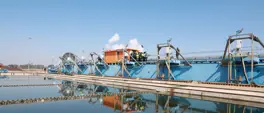
22 August 2025 10:43
MALAIKA MAHLATSI | Rand Water’s System 5A a light at the end of Gauteng’s water security crisis
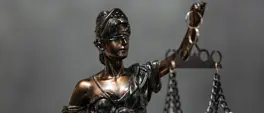
22 August 2025 10:12
JUDITH FEBRUARY & CHRIS OXTOBY | Legal Sector Code controversy must not be ignored

21 August 2025 17:02
PROF ZONDI: Despite early controversy, Ramaphosa’s National Dialogue signals a path forward
